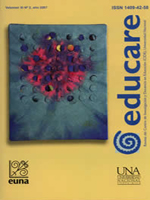Diversidad, diferencia y accesibilidad: Enfoques educativos en el discurso de la diversidad
DOI:
https://doi.org/10.15359/ree.11-2.1Keywords:
Diversity, education, accessibilityAbstract
This article outlines the unavoidable necessity to share the construction of a new school: more diverse, more plural that allows to adopt proposals and solutions according to the different own social and cultural contexts to establish high-priority lines based on the comparison of opportunities and the equality of rights
It outlines the necessity of reform, how many times it is necessary, the concept of diversity in order to assume and to assess the individual's multiple necessities and to make of the same ones the fundamental base of the planning of the society, in which the accessibility is the process in the one that you powered the individual's areas by means of the change of attitudes and the necessary adaptations based fundamentally on the achievement of the maximum functionality and autonomy.
References
Arnaiz, P. y Illán, N. (1988). "La integración en el marco de la Reforma de la enseñanza". Jornadas sobre la Reforma del sistema educativo, 129-143.
Arnaiz, P. y Lozano, J. (1996). Proyecto curricular para la diversidad. Madrid: CCS.
Brennan, W. K. (1988). El currículo para niños con necesidades especiales. Madrid:
SIGLO XXI.
Bruner, J. S. (1988). Desarrollo cognitivo y educación. Madrid: MORATA.
Camps, V. (1994). Los valores de la educación. Madrid: ALAUDA.
Cascón, P. (1993). Igualdad para vivir, diversidad para convivir: educar para no
discriminar. L'Hospitalet de Lobregat: Ajuntament de L'Hospitalet de Llobregat.
Cool, C. y otros. (1990). Aprendizaje escolar y construcción del conocimiento. Buenos
Aires: PAIDÓS.
Cool, C. y otros. (1992). Los contenidos de la Reforma. Madrid: SANTILLANA. ·
Cordero, H. (2004). "Educación inclusiva". Revista EDUCARE, 6(1), 23.
Delval, J. (1994). El desarrollo humano. Madrid: SIGLO XXI.
Devalle, A. y Vega, V. (1999). Una escuela en y para la diversidad: el entramado de
la diversidad. Argentina: AIQUE, Grupo Editor, S. A.
Dewey, J. (1916). Democracy and education. NewYork: FREE P RESS.
Escudero, J. M. (1995). "Los temas transversales y las reformas educativas: posibilidades y limitaciones". Ponencia presentada al Curso de Verano sobre "La transversalidad en la Reforma Educativa". Universidad de Mar/ Universidad de Murcia. Agulas, Julio.
García, J. A. (1990). "Un objetivo pedagógico: Educar para la Paz". Revista de Pedagogía Social (5).
Illán, N. (1989). Los profesores y la integración escolar. Valencia: NAU LLIBRES.
M.E.C. (1990). Evaluación del Programa de Integración. Madrid: MEC.
M.E.C. (1990). Orientación educativa e intervención psicopedagógica. Madrid: MEC.
Sáez, J. (1989). La construcción de la educación. Valencia: NAU LLIBRES.
Sáez, J. (1993). "Las condiciones cognitivas de la democracia". En Ortega, P. y Sáez, J. Educación y democracia. Murcia: CAJAMURCIA.
Sales, A. y García, R. (1997). El fenómeno multicultural: origen y fundamentos
ideológicos. Bilbao, España: DESCLÉE DE BROUWER, S. A.
Terré, O. (1998). Actualidades en educación especial. Lima-Perú: EL LIBRO AMIGO.
Terré, O. (2000). Variables entorno a la educación y la diversidad. Discurso VI Encuentro
Mundial de Educación Especial, Saltillo-Coahuila-MÉXICO.
Vygotsky, L. (1979). El desarrollo de los procesos psicológicos superiores. Barcelona:
CRÍTICA.
Published
How to Cite
Issue
Section
License
1. In case the submitted paper is accepted for publication, the author(s) FREELY, COSTLESS, EXCLUSIVELY AND FOR AN INDEFINITE TERM transfer copyrights and patrimonial rights to Universidad Nacional (UNA, Costa Rica). For more details check the Originality Statement and Copyright Transfer Agreement
2. REUTILIZATION RIGHTS: UNA authorizes authors to use, for any purpose (among them selfarchiving or autoarchiving) and to publish in the Internet in any electronic site, the paper´'s final version, both approved and published (post print), as long as it is done with a non commercial purpose, does not generate derivates without previous consentment and recognizes both publisher's name and authorship.
3. The submission and possible publication of the paper in the Educare Electronic Journal is ruled by the Journal’s editorial policies, the institutional rules of Universidad Nacional and the laws of the Republic of Costa Rica. Additionally, any possible difference of opinion or future dispute shall be settled in accordance with the mechanisms of Alternative Dispute Resolution and the Costa Rican Jurisdiction.
4. In all cases, it is understood that the opinions issued are those of the authors and do not necessarily reflect the position and opinion of Educare, CIDE or Universidad Nacional, Costa Rica. It is also understood that, in the exercise of academic freedom, the authors have carried out a rogorous scientific-academic process of research, reflection and argumentation thar lays within the thematic scope of interest of the Journal.
5. The papers published by Educare Electronic Journal use a Creative Commons License:














 The articles published by Educare Electronic Journal can be shared with a Creative Commons License:
The articles published by Educare Electronic Journal can be shared with a Creative Commons License: 



